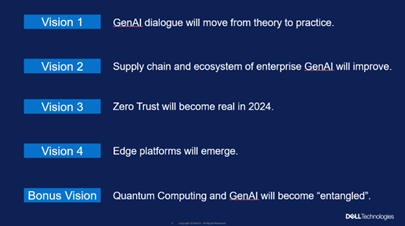
Dell’s 2024 vision for AI and zero trust. (Generated with AI).
Dell Technologies sees AI, zero trust, and quantum computing leading 2024
- 2024 is predicted to be the year when generative AI shifts from disruption to optimization.
- Edge platform-centric models to rise in prevalence.
- Zero trust infrastructure mandates expected in 2024 across industries.
The one-year anniversary of ChatGPT marks the beginning of the modern AI era, democratizing advanced AI for almost the entire global population. As 2024 approaches, the growing influence of AI is undeniable, yet it’s just one aspect of the broader IT industry’s evolution. All these facets are interwoven, collectively advancing the industry.
Dell Technologies recently hosted the Visions 2024 briefing in Asia Pacific & Japan (APJ). This virtual event, led by John Roese, Dell’s global chief technology officer, and Peter Marrs, president of APJ, focused on emerging trends shaping the technology industry in 2024 and beyond. The briefing also covered Dell’s role in helping customers navigate these trends and capitalize on regional innovation opportunities.
“AI is the center of the universe and edges are the way that you’ll put it into production. Zero trust is the way that you’ll end up securing it, and ultimately quantum will be the thing that powers it over the long term for the performance and efficiency needed to scale it into a global system,” said Roese. “Actively think of AI but do not do it independent of other architectures – this is how you’ll make sure your visions and actions align for long-term success.”
AI at the forefront in 2024
Roese presented four critical visions for the upcoming year, emphasizing the transition of generative AI from theory to practice. He noted that current uses of generative AI in business haven’t fully tapped its transformative potential. The year 2024 is expected to see these technologies being implemented in impactful ways in business operations.

John Roese’s outlook on pivotal tech trends for 2024 and beyond. (Source – Dell Technologies)
Roese underlined the shift in focus from developing generative AI models to their practical application. He highlighted the importance of operationalizing these models through AI inference, which adds real value. Companies are now transitioning from model development to deploying these models for practical data processing.
He pointed out that this shift prioritizes inference, requiring different infrastructure from the model training phase. Training involves extensive clusters and data centers, whereas inference focuses on efficient data processing. This shift necessitates reevaluating what effective inference infrastructure entails.
Inference infrastructure typically involves smaller, distributed setups, often at network edges. For example, Dell’s chatbots will use regional inference capabilities, for instance in Asia Pacific, for real-time responses, rather than relying solely on centralized data centers in North America.
2024: AI growth and security in the APJ region
Marrs emphasized Asia’s rapid AI growth and deployment opportunities, attributing them to the region’s openness to technology, innovative spirit, and leadership in AI adoption. Asia’s innovative leadership positions are strongly suited for impactful AI deployment.
Roese highlighted the importance of security in AI, especially for inference infrastructure. With adversaries trying to steal trained models during inference, secure architectures for inference are critical for the coming year.
Marrs also discussed challenges in AI implementation, including bias and cultural nuances. He stressed the importance of partnership and guidance for clients to navigate these challenges effectively. Dell aims to assist customers at various stages of their AI journey.
Lastly, Roese predicted that quantum computing will meet the high demand for computational resources in generative AI and large-scale AI applications. He foresees a hybrid quantum system, incorporating diverse compute architectures, including quantum processing units, to manage AI tasks.
Embracing multicloud and modern edge technologies
Roese explained that businesses have two primary options for establishing a modern edge network: developing multiple standalone edges or creating a multicloud edge platform. He advocated for the latter, suggesting that integrating the modern edge as an extension of multicloud infrastructure represents the most progressive approach.
Marrs emphasized the central role of data in shaping the future and the importance of using it to unlock transformative business opportunities. He noted that while multicloud solutions are now widely adopted in APJ, there’s a need for deliberate strategies to enhance business agility and drive innovation.
Zero trust: the new standard in security
In the security ecosystem, there is an anticipation that zero trust will become central to security discussions, as it begins to manifest in reality. The industry has concluded that the only path forward involves a radical architectural shift. The preferred architecture to adopt is zero trust. Understanding anomalies is intrinsic within this infrastructure, making zero trust a topic of detailed discussion. Over the past years, there has been a growing consensus about the validity of this path forward.
Currently, efforts are underway to actualize this concept. Project Fort Zero, announced recently by Dell, is an initiative using an architecture developed by the United States Department of Defense. “The aim is to industrialize this architecture and transform it into an offering for consumption by advanced customers worldwide, including defense departments, intelligence agencies, and governments,” said Roese.
“The plan is to introduce this to select markets next year. This will not only be a reference architecture for zero trust but also a full implementation of advanced zero trust at a data center level, offering a repeatable blueprint that is validated and approved by the consuming governments.”
This system, targeted at the ultra-high-end, is complex yet significant, as its existence will transform zero trust from a concept into a tangible reality.
Governments and industries globally are adopting zero trust as a mandatory requirement, even if full implementation is not yet feasible. For instance, the US Department of Defense CIO, John Sherman, has aggressively moved all operations under the Department to zero trust, collaborating closely with Dell.
Furthermore, Australia recently set a government-wide zero trust target, fully committing to this architecture. Similar movements are occurring in Europe and various industries. The coming year will witness early implementations of advanced zero trust systems and a progressive adoption and mandatory requirements for zero trust.

Australia announced a huge investment in cybersecurity. (Source – X).
“The prediction is that by the end of the next year, the focus within the security industry will largely be on enhancing the reality, pervasiveness, and adoption of zero trust. This marks a significant shift from the previous year, where zero trust was not a primary topic of conversation,” Roese added.
Forging a data-driven future in APJ
With rapid digital transformation and increasing digital maturity in APJ, Marrs sees the region as primed for significant advancements in emerging technologies. He believes that adopting an ecosystem approach in the coming year will enable collective learning and the application of best practices in technology deployment, thus maximizing impact on businesses and communities in APJ and beyond.
Marrs spoke about the critical role of collaboration and a united ecosystem in driving technological and business advancements. He cited generative AI as an example where industry collaboration is essential for more significant achievements. Marrs advocated for building a digital unity, where collaboration leads to the realization of digitally empowered concepts. He positioned Dell as a critical facilitator in this process, uniting expertise, solutions, and partners to help customers forge a data-driven future.
As 2024 approaches, Dell Technologies’ insights suggest a transformative year ahead, where generative AI evolves from disruption to practical optimization, edge platform-centric models gain prominence, and zero trust infrastructure becomes a mandated standard across various industries. With a focus on practical applications, security, and collaborative innovation, 2024 stands poised to be a landmark year in technology, setting new standards and opening up unprecedented opportunities for growth and advancement in the IT industry.
READ MORE
- Safer Automation: How Sophic and Firmus Succeeded in Malaysia with MDEC’s Support
- Privilege granted, not gained: Intelligent authorization for enhanced infrastructure productivity
- Low-Code produces the Proof-of-Possibilities
- New Wearables Enable Staff to Work Faster and Safer
- Experts weigh in on Oracle’s departure from adland






